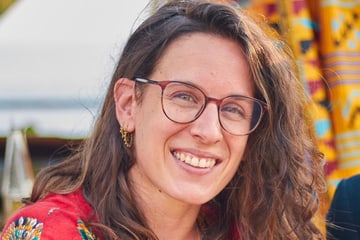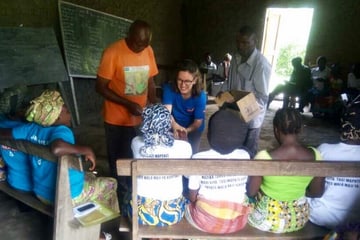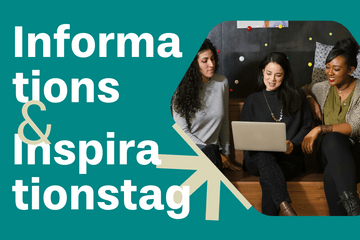Learning to take care of yourself before taking care of others
Since finishing nursing school, Rebecca had the idea of being a humanitarian health worker. She joined us for a virtual session at the Forum cinfo 2021 from a bar with an internet connection in Goma (DRC), where she was sheltering during a storm. She tells us more about her experience.

Rebecca Langer is a trained nurse currently working in health promotion for a national association in the Democratic Republic of Congo (DRC). After her training, she worked for three years in Swiss hospitals and then completed postgraduate studies in tropical medicine. She then worked for three years as a health worker for Medair in DRC, where she has remained and re-oriented her career to focus more on long-term development rather than humanitarian response.
She talks about her experience in DRC, the importance of preserving your mental health, and the enriching discovery of the humanitarian “world”.
Being a health worker abroad: what does it mean?
You might imagine Rebecca, as a nurse, working in a hospital and handing out medicine to people. She demystifies this image: being a nurse in humanitarian response is not about providing direct care to people. I manage emergency response in health projects. Rebecca’s function is, therefore, more like that of a manager. She is a project manager, in charge of the whole cycle from start to finish. She manages a team as well as resources: finances, budget, monitoring and evaluation. In her role, she is also in charge of the coordination and communication with various stakeholders (humanitarian actors or the Ministry of Health, for example), among other activities. Probably broader and more varied than you imagined, isn’t it?
A large part of Rebecca's work is office-based. She estimates it to be about two-thirds of her work. Like many jobs, there are also a lot of meetings that punctuate her day – both internal and external. Besides that, she additionally goes “on the field”, as they say, on mission. She oversees her team’s quality of work and activities, and meets with partners and communities.
Being a nurse in humanitarian response is not about providing direct care to people. I manage emergency response in health projects.
Being a manager of yourself
In addition to her responsibilites, Rebecca highlights that above all, you are a manager of yourself: “not only to work but to live”.
This is a lesson that she learned the hard way and which she is keen to share with us. “Learn to take care of yourself. We already know it, but sometimes we have to, unfortunately, experience it to put our health into perspective. And to see how important it is”. With great honesty, Rebecca talks about the mental challenges she has faced. She experienced a time when she was burnt out and exhausted: learning to become a manager, many projects going on, the Ebola outbreak, etc. This was when she reached her limit and went “down, down…”.
This experience – which she describes as constructive – did not make her question her wish to pursue working as a humanitarian health worker in DRC. However, she knew that to make it possible to pursue her true calling, she had to do things differently. She recognised that she had to take care of herself before taking care of others: setting limits in terms of work hours and to spending time to recharge.
In such a profession, often guided by dedication to a cause, the risk is to get burnout. Rebecca transparently reports that she has already confronted people who think it is part of being a dedicated health worker. Rebecca wants to warn about this: “It’s not normal, rather the opposite. We should set an example and encourage others to take care of themselves, so we can continue to do our work better.”
Learn to take care of yourself. We already know it, but sometimes we have to, unfortunately, experience it to put our health into perspective. And to see how important it is.

People bring you joy
Among various experiences and her discovery of a humanitarian response “world” – in her words – what brings Rebecca the most joy is the exposure to a new culture and its people.
She is now involved in a different type of work, active in health promotion, and still living in DRC. She discovered there a rich culture and met generous and engaging people. She highlights the importance of spending time with friends and being surrounded and well supported: “Meet people – learn from them, share with them”.
In conclusion, “Just go and discover. Follow your heart!” suggests Rebecca. And when leaving, remember to take Rebecca’s important message with you of taking care of yourself: “It never stops, and the world will keep turning anyway”.
Meet people – learn from them, share with them.



